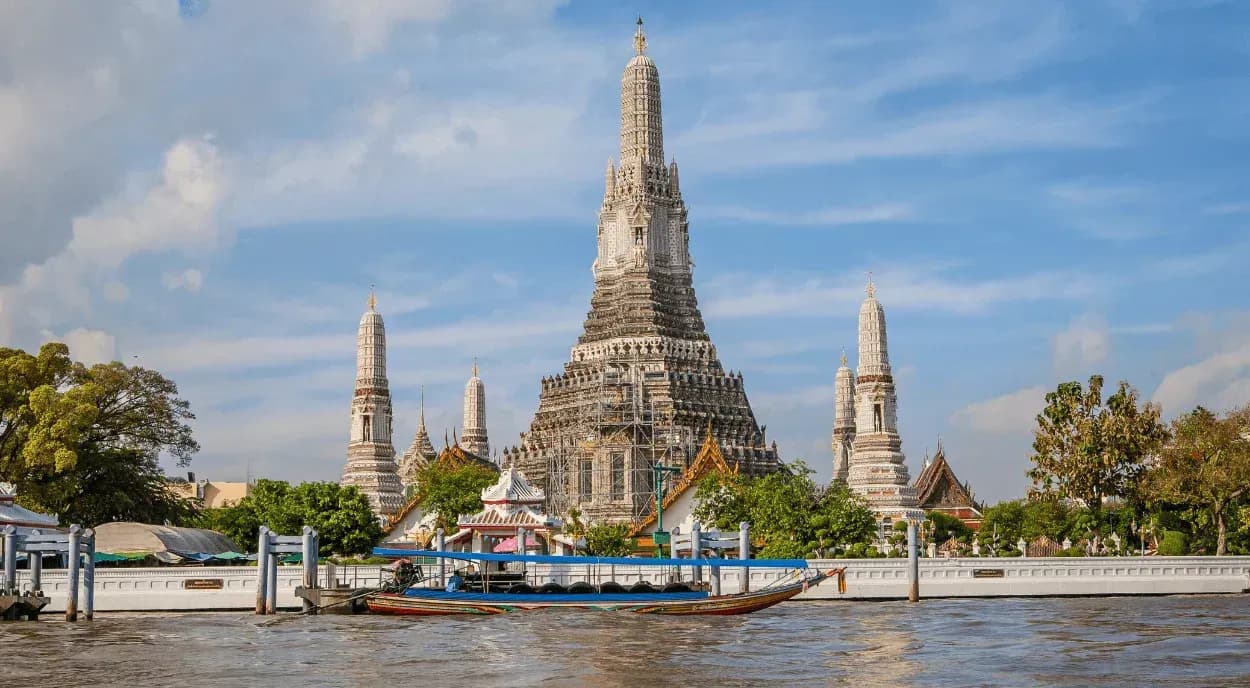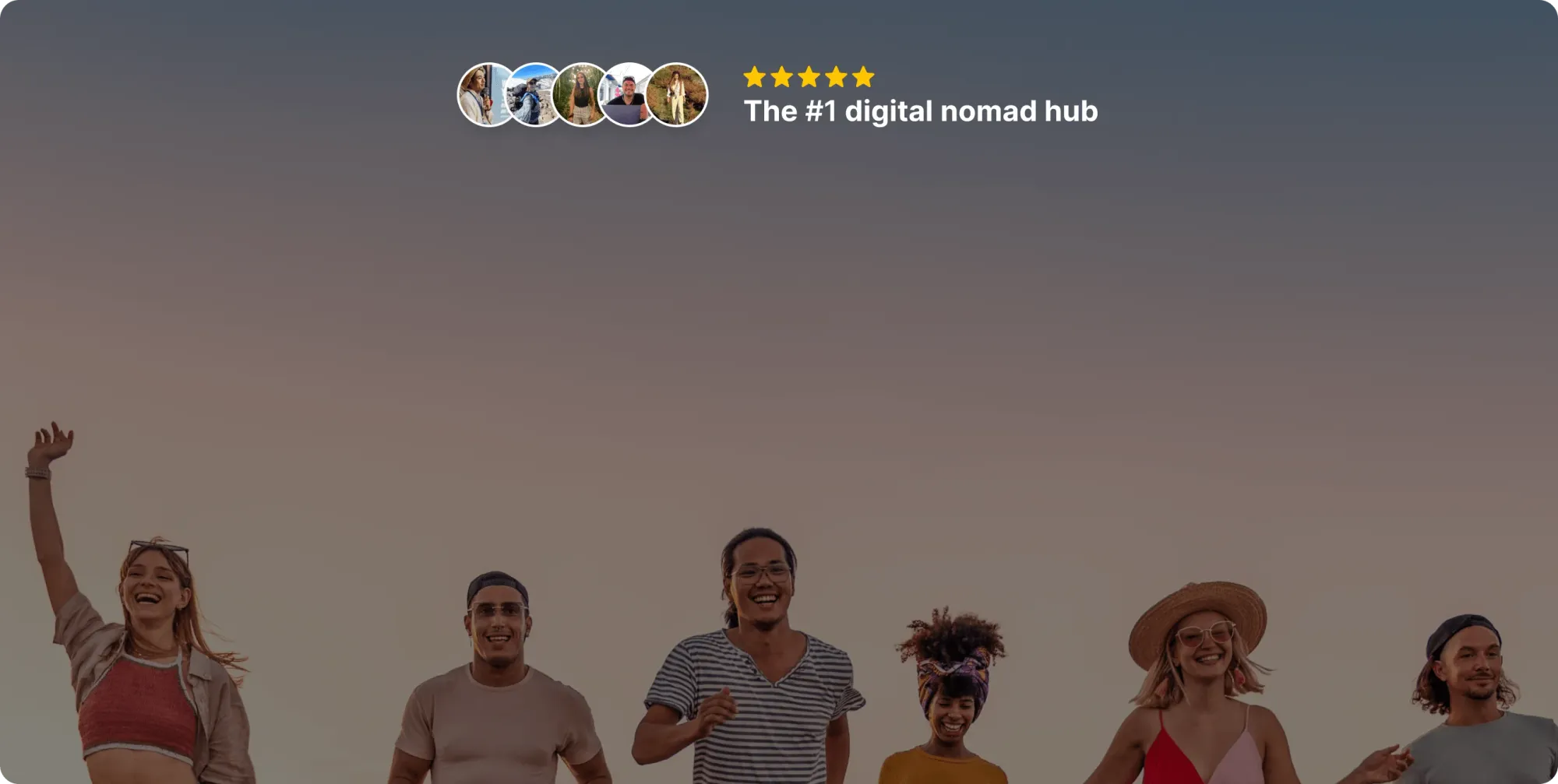The Ultimate Digital Nomad Guide to Living in Bangkok
Discover what it’s like to live and work in Bangkok as a digital nomad, with tips on cost of living, visas, workspaces, and more.


Bangkok has been one of the top destinations for digital nomads in Thailand, as well as one of the leading digital nomad hubs globally, for over a decade. After spending over a year there, I get it.
With over 9 million people, it’s a huge, bustling city that gives you everything from street food and local markets to rooftop bars with stunning skyline views, luxury malls, and a diverse nightlife scene.
It’s one of those rare cities that truly has it all, with some of the best value for money you’ll find anywhere on the planet.
In this guide, I’ll break down what it’s like to live and work here, share pros and cons, things to know before arriving, and tips to help you make the most of your stay.
Why Bangkok? My Experience as a Digital Nomad
My first trip to Bangkok was around 8 years ago, as a tourist. I did what most people around me did: went to the same overcrowded places like Khao San Road and got to experience a very specific side of the city. The first impression wasn’t great.
A few years later, I got an invite to work there from a buddy of mine, and I discovered a totally different Bangkok. I fell in love, kept coming back, and ended up spending over a year there as a remote worker.
What makes Bangkok special for me is just how effortless daily life feels. Everything you need is close by: gyms, food, coworking spots, malls, and parks. Getting around is smooth with great public transport or cheap taxis.
You can even stay in a modern condo with a gym and a pool, often for the price of a small studio in Europe. The city feels designed for an indoor lifestyle, which I really appreciated, especially since it’s quite hot and humid there.
But as a digital nomad, what really hooked me about Bangkok was the sheer variety of things to do. I get bored easily, but in Bangkok, there’s always something going on. I didn’t get bored for a second!
Pros and Cons of Living in Bangkok
Bangkok is not for everyone. It’s a massive, fast-paced city that can feel chaotic at times. But if you’re looking for an energetic, convenient city life, few places deliver like this.
Here are some pros and cons to keep in mind:
Pros
- Endless variety - food, events, restaurants, malls, and markets. There’s always something to do
- Very safe - even at night, walking around most areas feels completely fine
- Excellent value for comfort - for $700-$1000 you can rent a high-rise condo with a pool, gym, and 24/7 security (even less with a longer contract)
- Remote work friendly - fast internet, lots of cafes and coworking spaces, strong nomad scene
- Solid public transportation - the BTS and MRT make getting around easy and affordable while avoiding traffic jams
- Active nightlife - rooftop bars, clubs, and live music options all over the city
Cons
- Dirty streets and pests - rats, cockroaches, and trash are common in some neighborhoods
- Air quality can get bad - especially during burning season (Jan–May)
- Hot and humid - for most of the year
- Traffic - despite great public transport, if you find yourself far from it and need to get a taxi it’s not uncommon to get stuck in traffic
- Busy - the city is intense and can feel overwhelming
- More expensive than other Thai cities - Bangkok costs more overall than places like Chiang Mai and can get expensive relative to Thai prices you might find in Koh Lanta, for example
What’s the Cost of Living in Bangkok?
Bangkok is one of those places where you can get by on a tight budget, or live comfortably with access to high-end conveniences, depending on your lifestyle.
Here’s a breakdown of typical cost of living in Bangkok:
Rent
Short-term rentals start at around $600/month. One-bedroom condos usually range from $750–$1,500, depending on location, amenities, and length of stay. You’ll get better deals by staying outside tourist zones, signing a longer lease, or booking outside Airbnb.
Food
Local meals cost $1.50–$3. Western meals range from $6–$15. I usually spent around $300–$400/month eating out regularly.
Transportation
A 10–20 minute taxi ride costs around $5. BTS rides cost $0.50–$1.50. I usually spent about $70/month in total.
Entertainment & Other
Gym memberships range from $50–$70/month. For entertainment, expect to spend $5–$10 on cinema tickets, $9–$15 for a massage, and $1.5–$4 at cafes.
Recommended Budget
- For a single person: $1,500+
- For a couple: $2,000+
What Are the Visa Options for Digital Nomads in Bangkok?
There are two main visa options: one for short stays, and one for longer-term stays without needing to leave and re-enter the country.
Tourist Visa
Allows a stay of up to 60 days, with the option to extend for an additional 30 days, making it the most popular choice among digital nomads. Starting in May 2025, all foreign visitors will be required to complete Thailand’s Digital Arrival Card through the official website up to 3 days prior to their arrival.
Destination Thailand Visa (DTV)
Launched in July 2024, this five-year visa allows stays of up to 180 days per entry, extendable by another 180 days. It requires a valid health insurance, a minimum bank balance of 500,000 THB (~$14,400 USD), and proof of employment or freelance work.
Working Remotely in Bangkok
Bangkok is an incredible city to work remotely from. There are countless cafes, restaurants, rooftops, and work-friendly spaces across the city. You can grab lunch, plug in with your laptop, and work with a skyline view.
What makes it even better is the community. The city attracts entrepreneurs, freelancers, and remote workers from all over the world. It’s easy to meet people, join events or just strike up a conversation at a coworking space.
Internet and WiFi
Bangkok has some of the fastest and most reliable internet in the world. Most condos come with high-speed fiber, and it’s not uncommon to get 300–500 Mbps WiFi at random cafes, sometimes even faster.
5G mobile coverage is strong across the city. With an eSIM, you can expect 100 Mbps speeds in most areas. Monthly mobile plans start around $5 depending on the provider.
You won’t have to think about internet access in Bangkok, it’s fast, stable, and everywhere.
Work Spots, Laptop-Friendly Cafés, and Coworking Spaces
There’s no shortage of places to work from in Bangkok. Because the city is huge, your best option will often depend on the area you’re staying in. I always recommend checking Google Maps and photos to see what looks laptop-friendly nearby.
That said, here are a few of my favorite spots:
Best Coworking Spaces in Bangkok
- The Hive - My go-to. Big space, rooftop terrace, close to restaurants. Daily passes are available, and prices are reasonable
- True Digital Park - The paid coworking area is solid, but what makes it unique is the free open seating throughout the complex. Location is a bit out of the way
- The Urban Office - Quiet, well-equipped, and has great views
Best Laptop-Friendly Cafés in Bangkok
- Café Fenix, Tom N Toms – Both are solid 24/7 options
- Starbucks, Amazon, The Coffee Club - Big branches of these chains are reliable and usually have good WiFi, power, and seating
- Open House at Central Embassy - A mix of bookstore, café, and open workspace. Easy to find a table and spend a few hours
- Bank of Thailand Learning Center - Not a cafe, but worth a mention. A huge, quiet public space where people work and study
Best Areas to Stay as a Digital Nomad in Bangkok
Rule #1: stay near a BTS or MRT station. Doesn’t matter where, if you’re near a train, you’re good. Trains run every 5-10 minutes, and it usually takes under 15 minutes to get almost anywhere central. If you want to avoid traffic, this is a non-negotiable.
Here are some of the best areas to stay, each with its own vibe depending on what you're after:
Asok / Phrom Phong
BTS Asok / MRT Sukhumvit & BTS Phrom Phong
My favorite area. Super central, easy to get anywhere, and packed with everything you need - malls, coworking spots, gyms, food, and solid apartments. Stay near Soi 11 if you’re after nightlife, or Soi 20 and up if you want something quieter with more of a residential and business feel
Thonglor / Ekkamai
BTS Thong Lo / BTS Ekkamai
More high-end and feels luxurious. Lots of stylish cafes, rooftop bars, and upscale restaurants. I stayed here for two months and enjoyed it. It’s a bit pricier, but it feels a lot more polished.
Ari
BTS Ari
More chill, upscale. Not touristy at all, but has a lot of expats. Great cafes, walkable streets, and a slower pace. Perfect if you want to stay productive and avoid the chaos. Still super connected via BTS.
On Nut
BTS On Nut
A more budget-friendly option that is 10-15 minutes from central areas. You’ve still got everything you need there like cafes to work from and restaurants, more of a local area.
Silom
BTS Sala Daeng / MRT Silom
Off the usual path since it requires a BTS transfer to get to the main BTS but you still have everything you need there. The best part is that it’s close to Lumpini Park, which is a rare green space in the city.
Top Tips for Digital Nomads in Bangkok
Bangkok is an amazing place to explore, and the longer you stay, the more you’ll figure out what works best for your routine.
Here are some tips that’ll make your experience smoother from the start:
- Stay near BTS/MRT - Already mentioned, but worth repeating. It makes life way easier.
- Get a rabbit card - it’s a card you precharge and use for the BTS. Saves you time so you don’t need to buy a ticket each time.
- How to Find Cheaper Stays - Airbnb gets expensive, you’ll find better deals on Facebook groups. You could also look for “serviced apartments” on Google and visit places directly, they offer better prices when you skip Booking and ask directly.
- Avoid burning season - From January to May the air quality is the worst. The best air quality is from June - September.
- Use Grab for taxis - Bolt is a bit cheaper but they don’t run background checks on their drivers. Since prices are fixed in Grab, it’s also useful to check prices and then use them when negotiating with taxi drivers, they’ll often accept the Grab price or something close to it.
- VIP Cinema - if you like VIP cinemas or IMAX then BKK has some truly amazing options for a reasonable price.
- Food delivery - Foodpanda is good but expensive, GrabFood is better and Linemen is even cheaper, it’s what the locals use.
- Learn some Thai - Basic words go a long way. I highly recommend learning numbers (1–1,000). Being able to ask “how much?” in Thai and actually understanding the price makes things smoother.
Best Digital Nomad Communities in Bangkok
There are always meetups happening and a community around Bangkok. The expat community is the largest, and there’s a very large and active community for momads as well:
Meetup.com groups
- Bangkok Digital Nomads - The most active meetup group with weekly meetings, also have a Telegram and a Whatsapp group
- Bangkok Expat, Digital Nomads Meetup and Language Exchange - a group with more people and a more mixed crowd, also hosts meetings regularly
Facebook groups
- Digital Nomads Thailand - an active group for Digital Nomads in Thailand, there are discussions there about Bangkok too
- Expats in Bangkok
- Bangkok Digital Nomads
Ready To Make Bangkok Your Next Nomad Destination?

Join our global
digital nomad community
Join us for free
Freaking Nomads is supported by you. Clicking through our links may earn us a small affiliate commission, and that's what allows us to keep producing free, helpful content. Learn more
Read Next


Digital Nomad Guide to Living and Working Remotely in Seoul


Fukuoka for Digital Nomads: The Ultimate Guide


